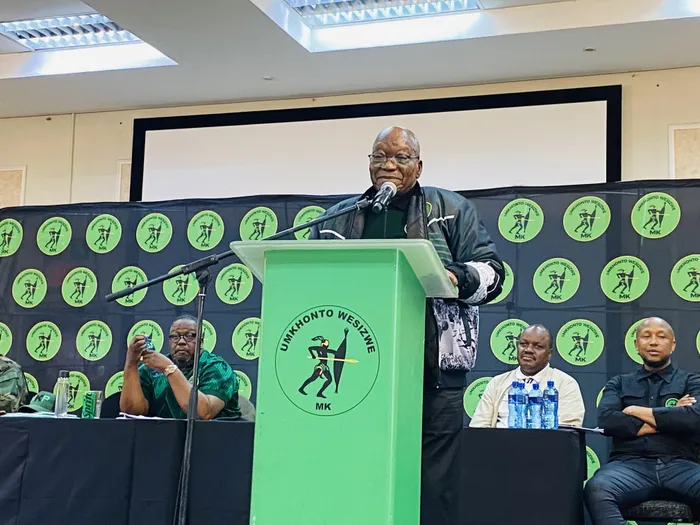‘SA flag belongs to citizens, not government': Zuma hits back at Minister Lamola over Morocco visit

MK Party leader Jacob Zuma addresses the media in Sandton, defending his use of the national flag during a recent visit to Morocco.
Image: Simon Majadibodu/IOL
The Umkhonto weSizwe (MK) Party leader, Jacob Zuma, has defended his use of the South African flag during a visit to Morocco, saying it does not belong exclusively to the government but to all citizens.
Zuma made the remarks during a press briefing held Friday in Sandton, where he addressed journalists alongside party officials following a meeting of the party’s National Officials.
Those present included Zuma, national chairperson Nathi Nhleko, MP and national spokesperson Nhlamulo Ndhlela, and other senior leaders.
“The South African flag doesn’t belong to the government. Is there anyone who doesn’t know that the flag of any country belongs to the citizens of that country? Is there anyone who doesn’t know that?” Zuma said, laughing.
“And you,” he added, pointing to journalists, “come here asking so many questions about the flag. Every country has a flag. Every citizen owns the flag. It’s not a government flag.”
His comments came after Minister of International Relations and Cooperation Ronald Lamola raised concerns about the use of national symbols during Zuma’s visit to Morocco, which included a meeting with Moroccan Foreign Minister Nasser Bourita in Rabat on July 15.
Photographs from the meeting showed both South African and Moroccan flags displayed prominently, sparking diplomatic criticism.
“While we recognise and respect Morocco’s sovereign right to invite individuals and groups, DIRCO, on behalf of the Government of the Republic of South Africa, strongly protests the use of South African national symbols - in this instance, the South African national flag - during the meeting between Mr Jacob Zuma and the foreign minister of the Kingdom of Morocco,” Lamola said.
Zuma was accompanied by the MK Party’s Head of Presidency, Magasela Mzobe, during the visit.
DIRCO spokesperson Chrispin Phiri said the department viewed the display of the South African flag as a breach of diplomatic norms.
“The use of the South African national flag in a meeting with a member of a political party in opposition, which is a non-state actor, constitutes an abuse of existing protocol and decorum and undermines official bilateral relations between the Republic of South Africa and the Kingdom of Morocco,” Phiri said.
He explained that national symbols such as the flag inherently convey official state endorsement. Their use in such contexts, he added, “elevates the perception of the encounter to that of a state-to-state engagement,” which was not the case.
“This characterisation is inconsistent with established diplomatic protocol, as the participants did not represent the official positions or engagements of the South African state.”
Phiri said South Africa had conveyed its concerns to Morocco, asserting that the portrayal of the meeting could not be recognised as an official bilateral engagement.
“The government of the Republic of South Africa holds the firm view that the use of its national symbols in contexts implying official state endorsement of non-governmental engagements is inappropriate, irrespective of the setting,” he said.
“In the spirit of fostering and maintaining cordial and friendly bilateral relations, and consistent with the fundamental principles of mutual respect between sovereign states and non-interference in internal affairs, South Africa respectfully encourages the Government of the Kingdom of Morocco to refrain from such actions.”
He said adherence to these principles was essential to preserving positive relations between the two countries.
Zuma’s visit has sparked widespread criticism from political parties, including the governing African National Congress (ANC).
ANC Secretary-General Fikile Mbalula labelled Zuma a “sellout” for showing support to Morocco, which annexed Western Sahara in 1975 - a region South Africa recognises as occupied territory.
“We, as the ANC, will fight side by side for the self-determination of the Sahrawi people. We are in solidarity with them, and Morocco must stop the occupation of Western Sahara,” Mbalula said.
“Zuma is no messiah. He is a sellout of note. Whatever his reasons, we are not surprised. The decision to steal the assets of the ANC to form a political party, and call it what it is, to divide our people, to weaken the African National Congress for his own personal aggrandisement, is what he has been. History will remember him for that.”
Former MK Party secretary-general Floyd Shivambu also criticised Zuma’s recognition of Moroccan sovereignty, calling it “opportunistic” and a departure from the anti-colonial stance of South Africa’s liberation movements.
“This move contradicts our history of supporting oppressed peoples,” Shivambu said.
IOL Politics